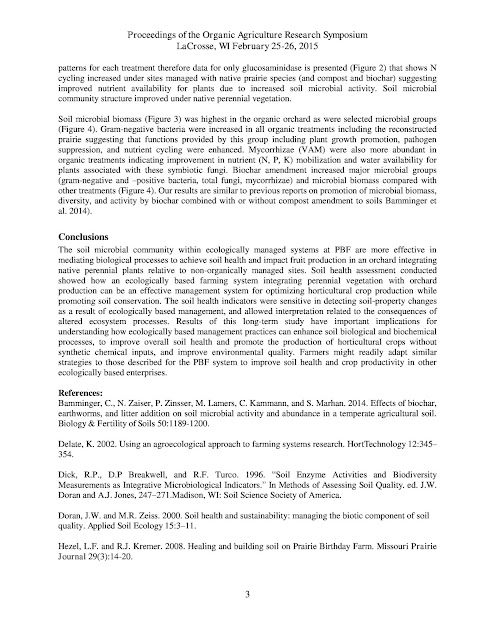I've been reading up on new ways to access changes in soil concerning the Soil's Biota (the microbes), who they are and what diversity there is. I've found a bunch of published writings on using phospholipid fatty acid (known as PLFA) as a method of measuring this factor. Microbial components are expressed as content of phospholipid fatty acid markers specific for each component. I've attached one article that used this method in measuring the microbial community structure on various sites including one treated with biochar. Since many of you continue to ask me about biochar this grabbed my attention. The study found that the site treated with biochar tested out pretty good, so I decided to look at this closer and when I did I found that the amount of biochar used per sq. ft. was 3.5 pounds, 152,460 pounds per acre. Holly Smolly, can you image using that much TerraPro, how fantastic the results would be? I've attached the paper so you can read it. I've also attached two images of a Vegetation Analysis using infrared done by our team members in California, Don De Boar and Bob Geyer, showing a clear benefit on almonds using TerraPro at a rate that's a tiny fraction of what biochar was used in the attached study, or the amount of compost that is used by many DOT agency's in doing highway re-vegetation construction. We have many images using Color Infrared (CIR) Imagery on corn silage, almonds, and pistachio orchards, all showing the same benefit of keeping the plants producing photosynthesis longer into the heat of the day while also keeping the soil and vegetation cooler. We can only imagine what the changes and benefits are to using less water because of this, but we do have reports from some of our growers who have been able to reduce irrigation by large amounts such as 50% or more.
Michael Martin Melendrez
Managing Member, Soil Secrets LLC
1850 E. Main St. Suite A2
Los Lunas, NM 87031






